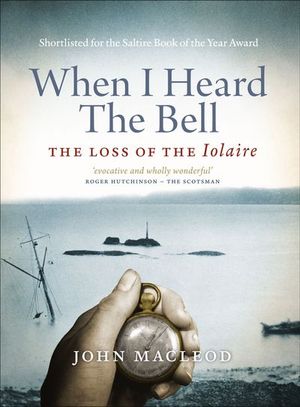When I Heard the Bell
Published by Birlinn Limited
The author of River of Fire examines the events surrounding the post-World War I sinking of HMY Iolaire and its aftermath.
On December 31, 1918, with hours from the first New Year of peace, hundreds of Royal Naval Reservists from the Isle of Lewis poured off successive trains onto the quayside at Kyle of Lochalsh. A chaotic Admiralty was unprepared for their safe journey home. Corners were cut, an elderly and recently requisitioned steam-yacht was sent from Stornoway, and that evening HMY Iolaire sailed from Kyle of Lochalsh, grossly overloaded and with lifebelts for less than a third of all on board. The Iolaire never made it. At two in the morning, in pitch-black and stormy conditions, she piled onto rocks only yards from the harbor entrance and just half a mile from Stornoway pier, where thronged friends and relatives eagerly awaited the return of their heroes. 205 men drowned, 188 of them natives of Lewis and Harris—men who had come through all the alarms and dangers of World War I only to die on their own doorstep on a day precious to Highlanders for family, celebration, and togetherness. The loss of the Iolaire remains the worst peacetime British disaster at sea since the sinking of the Titanic.
Yet, beyond the Western Isles, few have ever heard of what is not only a cruel event in our history but also an extraordinary maritime mystery—a tale of bureaucrats in a hurry, unfathomable Naval incompetence and abiding, official contempt for the lives of Highlanders, but of individual heroism, astonishing escapes, heart-rending anecdote and the resilience and faith of a remarkable people.
On December 31, 1918, with hours from the first New Year of peace, hundreds of Royal Naval Reservists from the Isle of Lewis poured off successive trains onto the quayside at Kyle of Lochalsh. A chaotic Admiralty was unprepared for their safe journey home. Corners were cut, an elderly and recently requisitioned steam-yacht was sent from Stornoway, and that evening HMY Iolaire sailed from Kyle of Lochalsh, grossly overloaded and with lifebelts for less than a third of all on board. The Iolaire never made it. At two in the morning, in pitch-black and stormy conditions, she piled onto rocks only yards from the harbor entrance and just half a mile from Stornoway pier, where thronged friends and relatives eagerly awaited the return of their heroes. 205 men drowned, 188 of them natives of Lewis and Harris—men who had come through all the alarms and dangers of World War I only to die on their own doorstep on a day precious to Highlanders for family, celebration, and togetherness. The loss of the Iolaire remains the worst peacetime British disaster at sea since the sinking of the Titanic.
Yet, beyond the Western Isles, few have ever heard of what is not only a cruel event in our history but also an extraordinary maritime mystery—a tale of bureaucrats in a hurry, unfathomable Naval incompetence and abiding, official contempt for the lives of Highlanders, but of individual heroism, astonishing escapes, heart-rending anecdote and the resilience and faith of a remarkable people.
BUY NOW FROM
COMMUNITY REVIEWS

